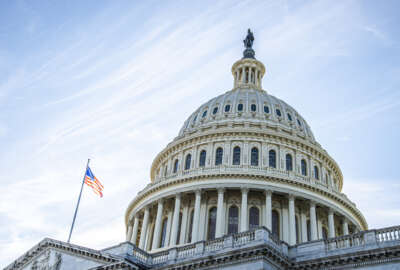Pay, Benefits Time Check
Although it may be hard for many federal workers to understand, legislation that would benefit them has a very low priority on Capitol Hill, says Senior...
One of the toughest jobs in Washington is lobbying for improved pay, benefits and working conditions for federal government employees. Or retirees. Because…
Despite its continuing growth, most Americans don’t work for the federal government. Nor do they live inside our beloved, traffic-choked Beltway. Or want to.
Many, if not most, taxpayers probably don’t understand what all those bureaucrats do all day. And why they make so much money. Chances are if they admit to knowing one honest, diligent federal worker, that person is either a close friend, loved one or good neighbor.
By the same token, some federal workers anxious for a buyout, pay raise or improvement in benefits, don’t realize how low their desires are on the political priority totem pole.
When the President proposed a small pay raise for feds last year, several people predicted it would make him a one-term president, and that any member of Congress who didn’t support a higher raise would be defeated at the polls. But the reality is that except for a handful of members of Congress (whose districts are full of federal workers) voting against a pay raise would probably win them votes.
Bottom line: Trying to make work-life easier, better and more lucrative for civil servants is is like rolling a heavy rock uphill. Possible, but definitely not easy.
Members of the federal family hit the jackpot last year. A fed-friendly Congress and White House okayed a variety of changes ranging from options within the TSP, a new sick leave deal for FERS employees, making it easier for CSRS workers to go part-time before retirement and legislation to permit retirees to return temporarily to government and receive full pay and pension.
Pressure from unions (primarily the AFGE) convinced Congress to kill off the love-it-hate-it National Security Personnel System covering more than 200,000 Defense civilians.
But that was 2009. This is 2010 and the political pickings for members of the federal family are likely to be slim.
Groups representing feds have an agenda. But unlike the last round of legislative gains, most of the next round of changes they want will cost money that politicians don’t want to shell out in an election year.
It’s easy, when you want something from Congress, to develop tunnel vision. To see it as a primary issue and to be impatient when there is no progress. Case in point. A reader last week asked about the bill to permit feds at retirement to rollover unused annual leave into the TSP. It’s a good idea. Makes sense and would benefit a lot of people.
I told her the House Government Oversight-Reform Committee had just approved it.
Yesterday, several readers asked for an update.
Here’s the deal folks: Congress moves very, very slowly (most of the time). This is a bill that is a hot ticket item to some feds (particularly high-salary workers close to retirement). But it is a low priority for most voters and most politicians. There are hundreds more bills with a bigger following.
As far as pro-fed legislation goes, the TSP annual leave rollover has a good chance. But don’t look for daily, or even weekly progress reports because this, like most other pro-fed bills, is taking the slow boat.
SES & 5-Day Mail Delivery
So how far along is the Postal Service proposal to go from 6 to 5 day delivery? And what would it mean for postal workers and patrons? Today at 10 a.m. (EDT) on our Your Turn with Mike Causey radio show, Fredric V. Rolando, president of the National Association of Letter Carriers will talk about the proposed service cut.
At 10:30 a.m. (EDT) Carol Bonosaro, president of the Senior Executives Association, talks about why so many GS 14 and 15 workers no longer aspire to join the SES.
Listen if you can and e-mail any questions to: mcausey@federalnewsradio.com
Nearly Useless Factoid
by Suzanne Kubota
From the BookofOdds.com: “The odds an adult has ever eaten cold pizza for breakfast are 1 in 2.56 (US, 5/2005).” The Nearly Useless vein runs deep in this one.
ALSO ON FEDERAL NEWS RADIO
The Federal Newscast
Here are just a few of the headlines from this morning’s Federal Newscast: OPM hiring reform memo nearly ready, Defense Travel System may never be fixed, Predator Bee drones may be headed to Texas, Rep. Norton criticizes US Park Police, and USCG diversity hits problems. For these stories and much more, click here.
Got an iPhone?
Get the Federal News Radio iPhone app! Listen live, read Mike Causey, and listen to interviews from all of your favorite shows on demand. Stay on top of the latest news affecting the federal government and contracting community all from the palm of your hand. And the best part – it’s free! Go to the app store and search for Federal News Radio. For more, click here.
Copyright © 2024 Federal News Network. All rights reserved. This website is not intended for users located within the European Economic Area.





